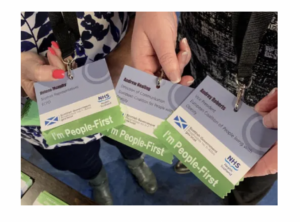People First
Words Matter – using People-First Language
Words, and the language we use, influence how we think, our attitudes and biases. People living with stigmatised diseases have to live with the disease, and they also have to live with the stigma of the disease. Person-First-Language-Guide-Addressing-Weight-Bias
One of the first steps in reducing stigma is to use person-first language, where we put the person before the diagnosis. People are not defined by health conditions or diseases, they are a person living with that condition or disease.
The language used by healthcare professionals can have a profound impact on how people living with chronic disease, and those who care for them, experience their condition, and how they feel about living with it day-to-day.
At its best, good use of language; verbal, written and non-verbal, which is compassionate and non-judgemental, can lower anxiety, build confidence, educate, and help to improve self-care.
Conversely, poor communication can be stigmatising, hurtful and undermining of self-care, and have a detrimental effect on clinical outcomes.
When we speak about people living with chronic illness or disability, it is important to put the person before the diagnosis, describing what a person “has”, rather than asserting what a person “is.” You would not say that a person is ‘cancerous’, you would say ‘she has cancer’, or ‘she is living with cancer’, and you would not say that a person is ‘a psoriatic’, you would say ‘he has psoriasis’. You should also not say ‘she is a diabetic’ or ‘he is obese’, you should say “she has diabetes” or ‘he has obesity’ or ‘he is living with obesity’.
There are 2 excellent publications discussing how language matters in diabetes and obesity.
This is a quote from the publication Language Matters Obesity:
‘As healthcare professionals, we have a gift, a chance to make a difference when we interact with patients. In that limited time of interaction, the least we can do is understand the relevance of what we say – and be appreciative of another person’s life and challenges’.
More information can be found at the links below:

